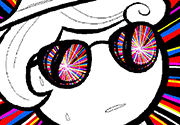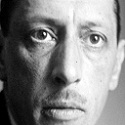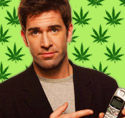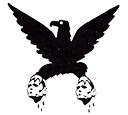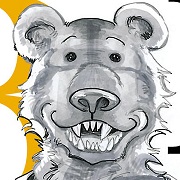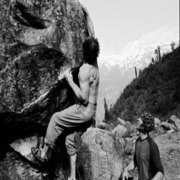|
Привет! Welcome to the new Russian Literature thread. The old one died, so here's the new one! Don't know where to start on this under read bunch of nut jobs? Let's explain who to read. There are three basic categories of Russian Writers, writers everyone knows, writers some people know and writers no one outside of Russia knows. Category 1: Writers Everyone Knows. This is the shortest category because there are few widely read Russian authors outside of Russia. There are tons of words all over journals and the internet about these authors, so just type in their names and learn how one is a hedgehog and the other is a fox. Examples: Lev (Leo) Nikolayevich Tolstoy (Лев Никола́евич Толсто́й). The most well known Russian writer. He's famous for writing incredibly long stories about people that have to make hard decisions but somehow always end up drinking and gambling. He also wrote a series of articles about Christian Anarchism that got him excommunicated from the Russian Orthodox Church. Tolstoy's most famous work is War and Peace, an epic length novel about the lives of Russian nobles during the Napoleonic Wars. I don't recommend reading this first to see if you like Tolstoy. Instead, if you want a short, snappy taste of his writing, read Hadji Murad. It's under 150 pages and contains all the choice cuts of Tolstoy's writing. Fyodor Mikhailovich Dostoyevsky (Фёдор Миха́йлович Достое́вский). Dostoyevsky is the other well known Russian writer. He mostly deals with people trying to figure out how to live. Some people go so far as to call him one of the first existentialist writers. The works he's most famous for are Crime and Punishment and The Brothers Karamazov. While these are two of the finest novels ever written, they are extremely long. If you want to read Dostoyevsky, read his collected short stories, which gives you an idea if you like his writing. Category 2: Writers Some People Know. These are the people who, while not quite reaching the heights of Tolstoy and Dostoyevsky, are fine writers that avid readers or scholars of Russian literature would know. You might have heard of them somewhere. Examples: Nikolai Vasilievich Gogol (Никола́й Васи́льевич Го́голь). While not actually Russian (he was born in the Ukraine), Gogol is one of the best Russian Romantics. He had two phases of his career, an earlier Romantic period where he wrote grotesque stories influenced by Ukrainian folklore and a later satirical period where he wrote about political corruption in Russian society. The latter period was a time of intense personal struggle that ended with him burning his manuscripts after having a personal conversion to Russian Orthodoxy, and then dying nine days after. Gogol's magnum opus is Dead Souls, an extremely long, unfinished book about the evil and corruption inherent in every Russian. If you want to start with Gogol, read some of his short stories especially The Overcoat and Nevsky Prospect. Aleksandr Isayevich Solzhenitsyn (Алекса́ндр Иса́евич Солжени́цын). The first modern writer we're talking about. Sentenced to a Gulag for writing anti-Stalin remarks in a private letter while serving in WWII, Solzhenitsyn was released under Krushchev's regime. Almost all of his writings are about being in a prison camp. He won the Nobel Prize for literature in 1970 for his novel, The Gulag Archipelago, but was forced to turn it down by the Soviet government. He famously hated communism but later said that he liked living under it better than Russia in the 90s. In a stunning turn of events, The Gulag Archipelago is incredibly long, so do not read it. Instead, read A Day in the Life of Ivan Denisovich. Category Three: Writers No One Knows Outside of Russia. These are the obscure ones. Because of a climate of Russophobia in much of the Western World during the Cold War, Russian writers didn't get the same amount of press as say, French and German authors of the same period. Russian is also a hard language to learn and translate, so a lot of these writers are untranslated. Examples: Russian Futurist Poets. Our first mention of poetry is an odd one. During the lead up to and after the October Revolution, there was a general feeling of revolution in the Russian arts. Futurism was one of the major styles during the early 20th century. The idea was to make a poetry for the future that reflected the lives of modern city dwellers. What we got was a lot of nonsense poems that used repeated sounds because they sounded like industrial machinery. This style was favored by Lenin and was allowed until he died and Stalin took over. Stalin hated abstract art, and for some reason most of the futurist poets died during Stalin's reign. Weird, huh? These are hard to find, but if you can, read the collected poems of Velimir Khlebnikov (Велими́р Хле́бников) and Vladimir Vladimirovich Mayakovsky (Влади́мир Влади́мирович Маяко́вский). More to come! Smoking Crow fucked around with this message at 02:54 on Aug 29, 2014 |
|
|
|

|
| # ? May 4, 2024 22:02 |
|
I made the critical mistake of reading War and Peace first of Tolstoy's works. I was in high school at the time and while I finished it, I can't tell you more than a bit about it! More recently I read some short stories of his. Think I'm going to see about reading War and Peace again soon. I remember enjoying parts of it a good deal, and I dug how he'd just suddenly veer into historical arguments about the Napoleonic Wars.
|
|
|
|
|
Anna Karenina absolutely owns, I recommend reading that before you pick up War and Peace again
|
|
|
|
Other cool russians worth reading: Mikhail Bulgakov (我不知道) You will probably mostly know him for The Master and Margarita and rightfully so. It is a good book you can show that you can show to others so that they think that you read more than comics and wheel of time books. But we all know the truth. It is a classic satirical story about the devil coming to soviet russia and generally causing havoc except almost no one knows he is doing anything because well, these things just happen. People disappear but that could be explained away (secret police tended to round people up). Also Jesus is apart of a huge plot point. Czech it out. Venedikt Erofeev (他是俄国人) ok, well to tell the truth I only really know of Moscow to the End of the Line by him but it is most definitely worth a read. Its a semi-autobiographical account of being a alcoholic russian man (so a russian) traveling in soviet russia heading to Petreshka(?). He once worked as a head of a group who just dug up and reburied the same pipe everyday but was fired after his graph charting peoples productivity based on how much they drank was accidentally turned in.
|
|
|
|
I have A School For Fools by Sasha Sokolov sitting next to me that I hear a lot of good things about that I am planning on reading soon.
|
|
|
|
Mike Gallego posted:I made the critical mistake of reading War and Peace first of Tolstoy's works. I was in high school at the time and while I finished it, I can't tell you more than a bit about it! If you liked his arguments, you might enjoy The Kingdom of God is Within You. That's his nonfiction book that lays out his theories on nonviolent Christian Anarchism.
|
|
|
|
Has anyone else read the Ice trilogy by Sorokin? I'd love to hear what others think of it because it continues to thwart my efforts at evaluation. A very singular work, to say the least.
|
|
|
|
|
Anton Chekov is a pretty cool guy, and was just second to Tolstoy in popularity when he died. His stories and plays are hilarious and a good example of how the best comedy often involves pure awfulness seen all screweyed.
|
|
|
|
|
Stravinsky posted:Other cool russians worth reading: A Country Doctor's Notebook is a great great read. Some of the middle stories (in the collectin of short stories) end up being too similiar but the openers and the closers are great (and somewhat gruesome).
|
|
|
|
Anyone want to recommend translations ? Pevear/volokhonsky are the most respected for Gogol, Dostoevsky and tolstoy, but what about other stuff? I read once that their Master & Margarita isnt the best. Thinking specifically of that, Oblomov, Hero of our Time, and Turgenev
|
|
|
|
Sir John Feelgood posted:Anyone want to recommend translations ? FWIW, my Russian lit professors always held up the Pevear and Volokhonsky translation of M&M to be pretty much the best out there. White Guard is worth a read if you like M&M. Also torrent the Russian miniseries version of M&M, it's great. Kind of. If after you read War and Peace you think to yourself "Man, that would've been a whole cooler if it was just set during World War II," read Grossman's Life and Fate. It's a lunker. Anyone have a good line on translations of early Russian Christian/Slavic pagan myths and histories? I've got a copy of the Medieval Russia's Epics, Chronicles, and Tales by Zenkovski but I'm not sold it's the best out there.
|
|
|
|
I found Tolstoy and Dostoyevsky to be horrible, pious bores but Sigizmund Krzhizhanovsky was a neato find in my local library. Early surrealist, not a very robust bibliography, but possessed of a great imagination and a sense of fun that comes through even in translation. Half of turn-of-the-century novelists write like they had their brain eaten by Jesus, it's the weirdest thing.
|
|
|
|
Sir John Feelgood posted:Anyone want to recommend translations ? It's an unrecommend, but I find Constance Garnett's work sometimes impressively bad. In The Devils, during the horrifying climactic showdown between Peter Verkhovensky and Kirillov, as Kirillov puts a gun to his head and shrieks the same word, over and over, trying to will himself into finally pulling the trigger in the name of his own philosophical principles, you might think that "Now! Now! Now!" would be the best possible translation. But Constance Garnett thinks that "Directly! Directly! Directly!" sounds much more dramatic, emotionally devastating and punchy. I...just don't know how you drop the ball on that. How do you drop the ball on that, Constance?
|
|
|
|
Yeah I bought the Barnes & Noble edition of The Idiot back in high school so I know how stuffy her translations are.
|
|
|
|
Pushkin, in spite of being grossly overrated in Russia, is a fine multi-genre writer whose prose translates really well. Also, Nabokov's translation of his verse novel "Eugene Onegin" is quite a trip. Pushkin was part African (long story), wrote poems about court ladies and their STDs, and died in a retarded duel. Turgenev, who was long regarded higher in the West than Tolstoy or Dostoevsky, is mostly known these days for his novel "Fathers and Sons", which popularized the term "nihilist". Glorified the Russian countryside while living in Paris. Would have been an Obama voter in contemporary America. Also, Dostoevsky trolled him something fierce. Chekhov is best known for his plays ("Three Sisters", "Cherry Orchard", etc.) in spite of being arguably one of the greatest short story writers in any language. One of the hip and trendy choices for the title of the greatest Russian writer. Was a medical doctor, liked to bang hookers, and was widely regarded as a supreme conversationalist.
|
|
|
|
|
I love Chekhov, who I feel like embodied modernism before modernism was even a thing. "The Lady With The Dog" is arguably one of the greatest short stories of all time. Also, if Nabokov counts, he's also a great author, though I've never actually read any of his works in Russian.
|
|
|
Ezzum posted:
he wrote most of his most famous works in english, actually
|
|
|
|
|
Iamblikhos posted:he wrote most of his most famous works in english, actually Though he also wrote a bunch of them in Russian (including Invitation to a Beheading, my favorite of his) and then translated them into English himself because his life was one long secret campaign to show he was better and smarter than everyone else, forever.
|
|
|
Oxxidation posted:Though he also wrote a bunch of them in Russian (including Invitation to a Beheading, my favorite of his) and then translated them into English himself because his life was one long secret campaign to show he was better and smarter than everyone else, forever. I don't think it was that secret.
|
|
|
|
Effectronica posted:I don't think it was that secret. I posted this in another thread a month or two back, but it's my favorite of Nabokov's pranks so it's worth reposting: Hieronymous Alloy posted:One of his stories ("Vasiliy Shishkov")may be the ultimate literary prank: basically, a critic kept denigrating Nabokov's writing, so Nabokov wrote poetry he knew the critic would like under a pseudonym, got the critic to praise the pseudonym, then wrote a short story with the psuedonym as a protagonist, at the end of which the psuedonymic protagonist evaporates into thin air. I think you can count Nabokov as a "Russian author" because he was Russian and he was an author, even if he didn't do most of his most famous work in Russian. Most (all?) of his works have Russian themes or draw on the Russian emigre experience in some way or other. Hieronymous Alloy fucked around with this message at 14:16 on Jun 19, 2014 |
|
|
|
Hieronymous Alloy posted:I think you can count Nabokov as a "Russian author" because he was Russian and he was an author, even if he didn't do most of his most famous work in Russian. Most (all?) of his works have Russian themes or draw on the Russian emigre experience in some way or other. i agree, though his russianness is less remarkable than him being one of literally a handful of writers to truly master multiple languages (beckett is another one, i'd say)
|
|
|
|
|
I read a lot of Dostoyevsky when I was an angsty teen pseudo-intellectual. This is no slight on Dostoyevsky; I always pretended to understand him but he really is a superlative writer. I'm slowly reading Pevear's translation of War and Peace...it really is extremely readable and lovely. Tolstoy is a great writer, though he does have this strange habit of describing people's physical features and tics and using those features to convey aspects of their moral, emotional or intellectual character. Strange. His confessions are very good, even if you don't agree with his heterodox, mystical take on Christianity. The chapters when he describes the depression that dogs him in the twilight of his life (and at the height of his fame) are disturbing and arresting. I find it curious that several of the major Russian authors had rather dramatic turns away from intellectualism and towards the christian faith of their upbringing (though Tolstoy was excommunicated by the Orthodox Church). Radio Talmudist fucked around with this message at 21:05 on Jun 19, 2014 |
|
|
Radio Talmudist posted:I find it curious that several of the major Russian authors had rather dramatic turns away from intellectualism and towards the christian faith of their upbringing (though Tolstoy was excommunicated by the Orthodox Church). I can only think of three "major" ones, and all three were certifiably mentally ill. Coincidence?
|
|
|
|
|
Radio Talmudist posted:I find it curious that several of the major Russian authors had rather dramatic turns away from intellectualism and towards the christian faith of their upbringing (though Tolstoy was excommunicated by the Orthodox Church). Well, Russia does that turn every 100 years or so Edit: Even Solzhenitsyn did it. At the end of communism, when he lived in Vermont, he would write opinion pieces for Russian newspapers, and in these, he said that the new democratic government of Russia should be based on Orthodox ideals not Western ones. Smoking Crow fucked around with this message at 00:13 on Jun 20, 2014 |
|
|
Smoking Crow posted:Even Solzhenitsyn did it. At the end of communism, when he lived in Vermont, he would write opinion pieces for Russian newspapers, and in these, he said that the new democratic government of Russia should be based on Orthodox ideals not Western ones. Hey Smoking Crow, when you read Solzenitsyn do you also find it literally less pleasant than passing kidney stones, or is it just me?
|
|
|
|
|
Speaking of Solzhenitsyn, I have a copy of Cancer Ward I got at a flea market for a dime. Have any of you read it? I remember it being name-dropped in Emperor Of All Maladies. I'm about 800 pages into War and Peace. I started it when it was the Book Of The Month on this board. My biggest problem is keeping all these characters straight. Socialized fucked around with this message at 06:15 on Jun 20, 2014 |
|
|
Socialized posted:Speaking of Solzhenitsyn, I have a copy of ancer Ward I got at a flea market for a dime. Have any of you read it? I remember it being name-dropped in Emperor Of All Maladies. That was my big problem too. I think I remember 4 or 5 which is pretty decent from reading it like 9 years ago in high school I guess? Also, at least in my translation, all the characters seemed to get multiple names depending on whether they were being Frenchified or in Russian. Or being referred to by last name, or title. But that's kind of a common thing in books of the era.
|
|
|
|
Socialized posted:Speaking of Solzhenitsyn, I have a copy of ancer Ward I got at a flea market for a dime. Have any of you read it? I remember it being name-dropped in Emperor Of All Maladies. Cancer Ward is pretty 7/10 imo Mike Gallego posted:Also, at least in my translation, all the characters seemed to get multiple names depending on whether they were being Frenchified or in Russian. Or being referred to by last name, or title. But that's kind of a common thing in books of the era. That's how the Russians keep you from learning their Real Name, which is why your magic is powerless against them. Iamblikhos fucked around with this message at 05:58 on Jun 20, 2014 |
|
|
|
Iamblikhos posted:That's how the Russians keep you from learning their Real Name, which is why your magic is powerless against them. And so Putin was victorious over the United States, for none could command him by his True Name.
|
|
|
|
|
Mike Gallego posted:That was my big problem too. I think I remember 4 or 5 which is pretty decent from reading it like 9 years ago in high school I guess? That happens in my translation, especially during dialogue. I got lost almost immediately because in the beginning, at the party where we are introduced to several characters, the hostess is using their French names, not their Russian names. Edit: My edition is translated by Ann Dunnigan. Is there a site that compares and contrasts the various translations? Socialized fucked around with this message at 06:50 on Jun 20, 2014 |
|
|
|
Iamblikhos posted:Turgenev, who was long regarded higher in the West than Tolstoy or Dostoevsky, is mostly known these days for his novel "Fathers and Sons", which popularized the term "nihilist". Glorified the Russian countryside while living in Paris. Would have been an Obama voter in contemporary America. Also, Dostoevsky trolled him something fierce. I was a Russian history major and did a few papers on guys like Turgenev. I think he gets a real bad rap. Basically, he was made fun of by his contemporaries for being a Germanophile and a bit of a coward, and Tolstoy picked on him something fierce. The only reason he was in Western Europe was because his dad died when he was young and his mom hated him, basically shipping him off far away from the family's estate. His letters to Dostoevsky, and the letters he got in return, reeked of unfair characterizations of Turgenev by Dostoevsky. Dostoevsky basically was pissed that he was getting arrested and harassed during the political turmoil of the 1840s and that Turgenev was sitting in Paris writing novels. He'd troll the poo poo out of the guy buy talking trash about him to all his contemporaries and giving his novels really bad reviews. He also hated Turgenev for not having a real motivation to his works (read: Turgenev was probably an athiest or an agnostic and didn't put forth a lot of religious zeal in his novels). Fathers and Sons, his most famous work, was written shortly after the emancipation of Russia's serfs by Alexander II, which could explain why he's viewed as someone who knows the plight of the Russian countryside despite living in mansions. Regardless, there was a growing class divide between the old guard and the new and Turgenev wanted to capture that. It's really a fantastic book about ennui and cynicism that slowly grows in rebellious youths over time. I highly recommend it and would also say 'Rudin' and 'A Sportsman's Sketches' as worthwhile books to pick up.
|
|
|
Doltos posted:I was a Russian history major and did a few papers on guys like Turgenev. I think he gets a real bad rap. Always nice to see a thoughtful response here, but I think you're mistaken about several things. Don't want to get into a long discussion if you're not looking for one, but the correspondence *between* the two was always cordial and filled with genuine respect (Dostoevsky wanted to publish Turgenev in his journal and commented on his mss, Turgenev loaned money to Dostoevsky when he was down on his luck, etc.). In letters to others and in some published writings, Dostoevsky occasionally badmouths Turgenev. Not because of his religious views specifically, but because of his character and because Turgenev represented everything Dostoevsky disliked about Europe's influence on Russia. (Dostoevsky also famously and hilariously parodied Turgenev in "The Possessed".) In spite of it all, Dostoevsky was a lot kinder to Turgenev than to some other Westerners. Also, many Russian nobles spent years in Europe in childhood and adolescence, but few lived there semi-permanently later in life and fewer still were involved in semi-public affairs with French women. Not that there's anything wrong with it, but it does make one doubt the sincerity of Turgenev sugary depictions of the common Russian people and their life. "Fathers and Sons" doesn't really have much to do with the country life, even though it takes place on an estate. Turgenev's reputation you're alluding to stems primarily from "A Sportsman's Sketches". "Fathers and Sons" is cool and worth a read, but it's typical Turvenev in being a novel about the 19th century Russian equivalent of first world problems. Incidentally, many progressives felt betrayed by Turgenev's portrayal of them in the novel, which hurt his feelings and made him wallow in self-pity and almost give up writing  And to say that Dostoevsky was "arrested and harrassed" is at best misleading. More like: arrested, kept in solitary confinement, sentenced to death, pardoned literally at the gallows, sentenced to years of forced labor in Siberia, then forced to serve as a private in the army in the middle of bumfuck nowhere, then years later pardoned and allowed to return to St. Petersburg under constant police surveillance.
|
|
|
|
|
I'm half way throu gh the Volkhonsky and Pevear translation of Brothers Karamazov and so far I like how it's basically a soap opera but with monks sometimes.
|
|
|
|
Iamblikhos posted:Hey Smoking Crow, when you read Solzenitsyn do you also find it literally less pleasant than passing kidney stones, or is it just me? Solzhenitsyn is a treasure you shut your hole.
|
|
|
|
Confirmed Russian literature tragics will know this anyway, but there's an extraordinarily bitchy - and brilliantly funny - parody of Turgenev in Demons (the 'great writer' Karmazinov). Dostoyevsky doesn't just mock Turgenev for his opinions or writings, he has a go at his appearance, his dress sense, his voice... truly inspiring stuff, I'd argue.
|
|
|
|
CestMoi posted:I'm half way throu gh the Volkhonsky and Pevear translation of Brothers Karamazov and so far I like how it's basically a soap opera but with monks sometimes. The monkss have gone away but now Dmitri's being accused of a murder he didn't commit. He's going to have a hard time explaining away his means, motive and opportunity though!
|
|
|
|
I bought a copy of Dead Souls that wasn't translated by Volkhonsky and Pevear (instead, Donald Rayfield) that I plan on reading after War and Peace and The Sportman's Sketches. I'm really liking their translation of War and Peace (although I have no frame of reference). Should I just go out and buy the Volkhonsky and Pevear translation? e: Eh, five seconds on Google yielded a pretty glowing review (http://www.nybooks.com/books/imprints/classics/dead-souls/) Mike Gallego posted:I made the critical mistake of reading War and Peace first of Tolstoy's works. I was in high school at the time and while I finished it, I can't tell you more than a bit about it! I'm only halfway through, but War and Peace is the first thing I'm reading by Tolstoy and I do not regret it. Maybe it was just too voluminous for a high school student? He captures little moments so viscerally and vividly. rest his guts fucked around with this message at 21:03 on Jul 11, 2014 |
|
|
|
quote:Chekhov is best known for his plays ("Three Sisters", "Cherry Orchard", etc.) in spite of being arguably one of the greatest short story writers in any language. One of the hip and trendy choices for the title of the greatest Russian writer. Was a medical doctor, liked to bang hookers, and was widely regarded as a supreme conversationalist. I'm actually surprised that Chekhov's reputation as a short story writer is not as widespread. I cannot read Russian, but I would recommend Ronald Hingley's translations of his stories to anyone who would like to check him out. As another poster said, a lot of his short fiction does anticipate a lot of modernist trends. Also, his characterizations are incredibly thorough.
|
|
|
|
Some years back I read Doctor Zhivago by Boris Pasternak, in its original translation; I don't know by whom. Recently I noticed that the library has since also gotten this same book in its Pevear/Volkhonsky translation, and I wondered how it compares to the older version. Is it much different? Do Zhivago's poems in translation actually seem poetic now? Also it put me in mind to ask what else Pasternak wrote apart from this. Meaty Ore fucked around with this message at 06:36 on Jul 20, 2014 |
|
|
|

|
| # ? May 4, 2024 22:02 |
|
Bit of a shame Zamyatin hasn't been mentioned yet. If you want to see a prophecy of Stalinist conformity before it actually came to pass (posterity is much easier to write from, Mr. Orwell), check out We. Dystopianism at its best. Also props to whoever linked to The Other St. Petersburg in the last thread. Sums up the insane, mythic qualities of Peter's city fantastically. Has anyone ever managed to see some of the insane Futurist plays that Mayakovsky, etc. were involved in during the '20s? Would love to see The Bedbug, or Victory Over the Sun or whatever.
|
|
|








